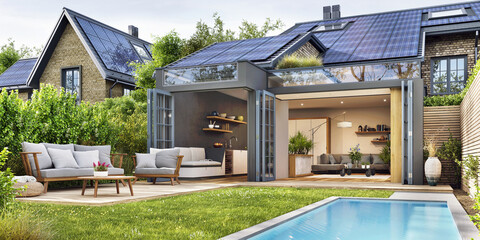If you are looking to cut energy bills, installing residential solar panels might be a good solution for you. They provide you with green electricity and reduce your consumption of electricity from the grid, which makes them the perfect option for those who are concerned about the environment. Also, solar panels do not produce carbon emissions or greenhouse gases, which makes them a green option for homeowners. As the most abundant source of renewable energy on the planet, solar energy has many benefits.
 Whether you opt for a high or low-wattage system depends on your home’s energy requirements. You should determine how much energy you use daily and divide this figure by the number of kilowatt-hours your home uses. The average monthly energy usage depends on several factors, including weather conditions. You can calculate the kilowatt-hours you require by multiplying your average energy usage with peak sunlight hours in your area. To learn more about residential solar panels, click here at https://www.bexsolar.com.
Whether you opt for a high or low-wattage system depends on your home’s energy requirements. You should determine how much energy you use daily and divide this figure by the number of kilowatt-hours your home uses. The average monthly energy usage depends on several factors, including weather conditions. You can calculate the kilowatt-hours you require by multiplying your average energy usage with peak sunlight hours in your area. To learn more about residential solar panels, click here at https://www.bexsolar.com.
In case your roof isn’t in good shape or you are not very handy, you can choose to hire a professional to install your solar panels. In case you’re not sure about the process, talk to the company where you purchased the panels. Most likely, they offer special pricing for installation, and they also have a network of subcontractors who can do it for you at a reasonable price. Keep in mind that your roof may need to be replaced before you can install your solar panels, as the old roofs may not have a structure that can support their weight. If the panels are covered in leaves, pollen, or other debris, you’ll need to take them down and replace the roof.
Installing a residential solar panel system is a great way to cut your electric bill. Not only will you have your energy, but you’ll also save a lot of money over the life of the system. Residential solar panels can be a great way to cut your electricity bill and help the environment at the same time. You can also benefit from a federal solar tax credit to offset the upfront costs. Additionally, some states may have similar incentives for solar installations.
If you don’t have a roof, you may also want to consider a ground mount installation. This is a popular choice among homeowners without a roof. You can also subscribe to a community solar system, which is where you share your system with other homeowners. By going this route, you avoid roof-related hurdles and can own a solar system at the same time. The biggest advantage of these systems is that they are relatively maintenance-free.
Installing solar panels will also improve your home’s resale value. Buyers are generally more willing to pay more for a home that has solar panels installed. Installing solar panels on your home can make your property worth a lot more than you originally spent on it. For every kilowatt of electricity produced, most homeowners will see an average increase in value of $5,911 – more than eight thousand dollars.
If you are looking for the best residential solar panels, you need to do your research. You must make sure that they can meet your household’s energy requirements and will last for many years. It is important to do the proper research and contact your local installer to learn about the many options available. So, how do you choose the best solar panels for your home? Here are a few tips:
Before installing a solar system, you should take some time to determine the size of your roof. If you have plenty of sunlight, a solar panel installation may be the best option for you. However, you must be willing to spend a significant amount of money up front to install a system. Also, make sure to check out the cost-to-energy ratios before making a final decision. The higher your savings potential, the more likely you will save.
Residential solar panels are becoming increasingly affordable. The average cost of solar panels is almost half of what it was ten years ago. Compared to conventional electricity, solar energy produces no pollutants and does not cause harm to the environment. It is also much cheaper than conventional energy sources like fossil fuel. This makes it a great choice for homeowners who are looking to cut their electric bills. The benefits of solar energy are numerous. And, the benefits of these systems far outweigh the costs.
